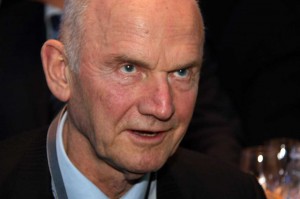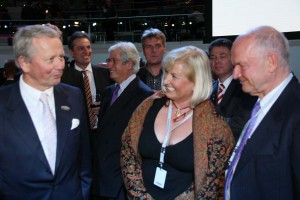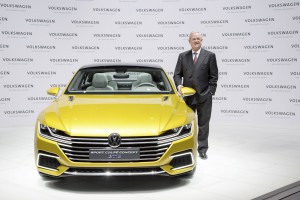
Ferdinand Piech, grandson of VW's founder, resigned as chairman due to a dispute over his successor.
Volkswagen Chairman Ferdinand Piech unexpectedly tendered his resignation over the weekend, capping a bitter battle over the future of the German automaker.
Piech, who has been credited with crafting the growth and acquisition strategy that transformed VW into the world’s second-largest car company, had clashed with other board members over his eventual successor. The 78-year-old Piech had openly criticized VW’s current CEO, and its likely next chairman, Martin Winterkorn.
The upheaval at Volkswagen appears to bolster the hand of the German unions in running the company – and could alter the trajectory of the company’s drive to become the world’s largest automaker. VW came a hairsbreadth short of dislodging Japanese rival Toyota last year.
Heir to Volkswagen founder Ferdinand Porsche, Piech, has capitalized on his family connections to play a pivotal role in shaping VW for nearly 30 years. In the process, he has scuttled the careers of other executives who crossed him, including his own hand-picked successor as CEO, Bernd Pischetsrieder.
But this time, he lost a showdown vote by a key supervisory board steering committee, which chose instead to side with Martin Winterkorn, VW’s current chief executive officer and architect of the company’s dramatic turnaround over the past decade.
Piech’s wife, Ursula, who was put on the supervisory board in 2012, also is resigning, effective immediately.
(VW goes big with C Coupe GTE concept. Click Here to find out more.)
The internal battle was a rare defeat for Piech, who himself served as CEO from 1993 to 2002. He has deftly – and often bluntly – used the family’s large shareholdings to reshape a company that was in serious trouble when he became chief executive. Among other things, Piech led a rapid expansion of the Volkswagen brand line-up, adding a mix of marques ranging from entry level Seat and Skoda to ultra-exclusive Lamborghini, Bentley and Bugatti.
One of the most recent acquisitions was Porsche, a company led by another brand of the large family. In a David-v-Goliath bid, cousin Wolfgang Porsche signed onto an effort by Porsche Cars to try to acquire the bigger maker. In the end, Porsche became another subsidiary of Volkswagen AG.
But those who bet on Piech in the latest battle were in for a surprise. In an interview with German newsmagazine Der Spiegel this week, the VW chairman clearly distanced himself from Winterkorn, the man who seemed certain to eventually become chairman after stepping down as CEO. That triggered a battle that quickly became public. But despite the fact that the various arms of the Piech/Porsche family control a majority of VWAG stock, the supervisory board stood behind Winterkorn.
(VW board gives Winterkorn vote of confidence. Click Here for the latest.)
Several things led to Piech’s defeat. For one thing, he appeared to lose the support of the state of Lower Saxony, which owns 20 % of VW’s stock, as well as the backing of employee representatives, who under German low control half the seats on the supervisory board.
The employees representatives, led by the German metalworkers union IG Metal, along with officials from Lower Saxony, ultimately sided with Winterkorn. Even Piech’s own cousin, Wolfgang Porsche, stood supported Winterkorn, labeling Piech’s critical remarks “a private opinion.”
With Piech out, the VWAG board named Berthold Huber chairman of the supervisory board on an acting basis.
German supervisory boards depend on consensus and Huber is expected to maintain the tradition. Huber’s tenure could last two years until Winterkorn, who will now have a free hand to select his own successor as CEO, is expected to become chairman.
How this will play out remains to be seen. Huber is known as a militant trade unionist. Last year, he told delegates to the United Auto Workers Union Constitutional Convention in Detroit the fight for the rights and dignity of people is never over and continues for every generation.
“People are still working in deplorable conditions around the world,” said Huber, reminding delegates of the recent mass deaths of workers killed in Bangladeshi clothing factories and in a coal mine in Turkey. “It is our duty to protect workers against these conditions and support each other in our fight for people and employee rights.”
Huber’s support became obvious when Volkswagen recently approved the UAW to represent workers at its plant in Chattanooga, Tennessee – that despite the fact that the union narrowly lost a representation vote at the factory last year.
Huber said the uncertainty created by Piech’s criticism of Winterkorn had to end. “The steering committee was and is conscious of its responsibility to Volkswagen and its many thousand staff,” he said.
The departure of Piech raises plenty of questions about Volkswagen’s future plans, particularly its aggressive expansion strategy which has been aimed, among other things, at overtaking Toyota as the world’s largest automaker by 2018.
(Global sales wars continue to heat up. Click Here for the latest.)
“Piech’s departure represents a seismic shift in Volkswagen’s power structure, and could foretell drastic changes in how one of the world’s largest automakers operates,” wrote Karl Brauer, senior analyst at data firm Kelley Blue Book.
While VW sales have grown rapidly in recent years, especially in the booming Chinese market, VW does face serious challenges. It has struggled to maintain demand in the U.S., despite the country’s economic recovery. And VW costs have been running higher than expected, leading to criticism from investors groups disappointed with its financial results.
(Paul A. Eisenstein contributed to this report.)



No surprise here after the other five members of the board voted against him and made him agree to the public statement endorsing Winterkorn.
I’m not convinced that VW’s acquisitions of other brands was a great business strategy so we’ll see how things turn out now that Piech is out.
If VW wants to increase sales in the U.S. they need to change their business ideology and operating practices or it will never happen.
The public statement that Piech was made to agree to did not stop him from secretly trying to still gather support to oust Winterkorn. Whe n this was found out Piech was given 2 choices by the board, either resign or be booted out. While he and his wife Ursula are no longer on the board and technically have no further duties with VAG they still own about 13.2% of voting stock. Further, even if they wanted to sell their shares they cannot just sell to anyone. My understanding is they have to sell someone else on the board. However knowing Piech’s history and his personality(ruthless and difficult), I seriously doubt that he will completely give up this fight. Since 2008 when the Porsche debacle unfolded in it’s attempt to purchase VAG I seriously doubt that Wolfgang Porsche and Piech have been on exactly good terms. So that when Wolfgang sided with the other board members he was in effect getting his revenge on Piech due to the opportunity that Piech himself created. Further it seems to me that as successful as Piech has been in making VAG the 2nd largest global automaker it has also exposed certain weaknesses.
I think the way VAG is run in politbureau form has hindered it’s ability to make fast changes to being more competitive in certain markets as well as it’s ability to make an inexpensive yet competitive small car. The US market clearly has to be both Piech’s and Winterkorn’s failure. In reality I think someone from the works council and perhaps even the board in Wolfsburg should spend a year living in the US to try and figure out what sells and why among VW’s competition. Just having a division head has not been the answer. The SUV’s and trucks are 3 to 4 years late as is a small car. The styling of the Passat and Jetta(which I actually like) are early 1990’s BMW teutonic austere. They don’t work in 2015.
FWIW – VW has had brand execs as well as Piech, Winterkorn and others come to the U.S. and go to dealerships to try and understand the issues but they don’t seem to understand the obvious which IMO is product quality issues, dealer service issues and replacement part prices. Thus the VW ownership experience is simply unacceptable compared to the competition be it from U.S. or Asian auto makers.
IMO the issue is not that U.S. customers are fat and require wider interiors – though that may be a nice selling point for more comfort. I also don’t think VW’s styling is great but it’s reasonably current/acceptable to many consumers. Lowering the sticker price and offering affordable leases is how VW initially started a sales recovery but the actual overall VW ownership experience killed any brand loyalty attached to the product. Conquest sales are expensive and futile if the loyalty retainer ratio is extremely low.
This is what VW Ag doesn’t seem to understand. They have forced their dealers to redesign their stores but they haven’t been able to change the dealership mentality. In addition VW’s replacement parts prices are absurd in most cases.